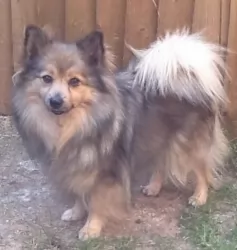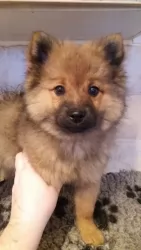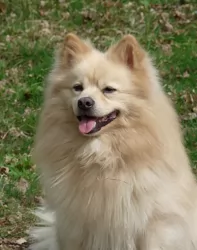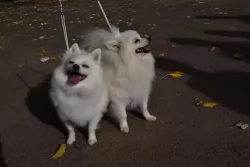 MyDogBreeds
MyDogBreeds Norfolk Terrier is originated from United Kingdom but German Spitz (Mittel) is originated from Germany. Norfolk Terrier may grow 12 cm / 4 inches shorter than German Spitz (Mittel). Both Norfolk Terrier and German Spitz (Mittel) are having almost same weight. Both Norfolk Terrier and German Spitz (Mittel) has same life span. Both Norfolk Terrier and German Spitz (Mittel) has same litter size. Both Norfolk Terrier and German Spitz (Mittel) requires Moderate maintenance.
Norfolk Terrier is originated from United Kingdom but German Spitz (Mittel) is originated from Germany. Norfolk Terrier may grow 12 cm / 4 inches shorter than German Spitz (Mittel). Both Norfolk Terrier and German Spitz (Mittel) are having almost same weight. Both Norfolk Terrier and German Spitz (Mittel) has same life span. Both Norfolk Terrier and German Spitz (Mittel) has same litter size. Both Norfolk Terrier and German Spitz (Mittel) requires Moderate maintenance.
 It was in the 1880s that a working terrier was developed in eastern England. The Norfolk Terrier was developed by crossing local terrier-like dogs with the Irish Terrier breed as well as small red terriers.
It was in the 1880s that a working terrier was developed in eastern England. The Norfolk Terrier was developed by crossing local terrier-like dogs with the Irish Terrier breed as well as small red terriers.
Known first as the Cantab Terrier and then later as the Trumpington Terrier, the name changed further but in 1932, the Norwich was accepted into the English Kennel Club and the first written standard was created.
The Norfolk Terrier was recognized by the United Kennel Club in 1979. It has gained recognition as an independent breed but is a variety of the Norwich Terrier, distinguished from it by having floppy ears and not erect ears. Both the Norfolk- and Norwich are the smallest of the working terriers.
 Originating in Germany, the German Spitz Mittel is an alert, vigilant dog and it is these qualities that made him sought after for working on farms.
Originating in Germany, the German Spitz Mittel is an alert, vigilant dog and it is these qualities that made him sought after for working on farms.
He is no new breed and is the 3rd largest of the five German Spitz varieties. It is believed that the German Spitz descended from the Northern sled and herding dogs which arrived with the Vikings into Europe. When you do research you see that the dogs are mentioned in German literature which dates way back to to 1450 already.
 The Norfolk Terrier is a small purebred dog, standing at 23 to 25cm in height and weighing roughly between 4.5kg and 6kg. The dog has a wire-haired coat which can be in different colors such as wheaten, red, black and grey or grizzle.
The Norfolk Terrier is a small purebred dog, standing at 23 to 25cm in height and weighing roughly between 4.5kg and 6kg. The dog has a wire-haired coat which can be in different colors such as wheaten, red, black and grey or grizzle.
The hair on his head and ears is shorter and smoother and he has longer whiskers and eyebrows. The chest is deep, the front legs are short and straight and the tail has always been docked to half its length but left long these days. The tail is set high and carried erect.
Norfolks are feisty, fearless dogs with an independent streak. They’re gentle though, and when it comes to being a companion dog, they get on well with children and other pets. They thrive on their human family’s companionship and wouldn’t do well at all if they were constantly left outside.
They’re not yappy dogs but will bark occasionally so he can sound the alarm if strangers approach.
This little dog is able to live in the city or the countryside, but just because he is little, you can’t neglect his exercise needs. He will most certainly need to be exercised every day and taken for walks as he is an energetic, lively dog. He is intelligent too and easy to train and socialize, turning him into such an obedient, pleasurable pet.
 The German Spitz Mittel is similar in looks to the other sizes of German Spitz. The Mittel is a medium sized dog and stands between 30 and 38cm in height and weighs between 7 and 11kg. You’ll find him in solid colors such as tan, liver, white, fawn, black or a mix of these colors.
The German Spitz Mittel is similar in looks to the other sizes of German Spitz. The Mittel is a medium sized dog and stands between 30 and 38cm in height and weighs between 7 and 11kg. You’ll find him in solid colors such as tan, liver, white, fawn, black or a mix of these colors.
He has a soft woolly undercoat and a long outercoat with a mane-like ruff at the neck. He has a fairly long muzzle, dark eyes, sharp erect ears and a bushy tail which curls over his back.
Affectionate, faithful, and always happy by nature, the German Spitz Mittel is a family companion that wants to be part of everything his human family is up to. He makes a good watchdog. He is alert and has a distrust of strangers.
He gets on well with children in the home and he can also live in peace with other dogs. Because he is an intelligent dog, you won’t have much trouble with training- and socializing him, although he will require a firm, consistent owner and trainer.
Training and socialization are important as there are always some important commands such as sit, stay, come and lie down that you will want him to respond to immediately.
 Fearless and brave, the Norfolk Terrier promises to be a wonderful companion.
Fearless and brave, the Norfolk Terrier promises to be a wonderful companion.
They're social, loving dogs and want to be part of the household. He is lively and active too and wants to be included in your walks and your games. He loves nothing more than to be running across a field after a ball.
They’re such amicable pets that they make great dogs for first-time dog owners. Let him into your heart and your home – he makes such a splendid pet – that once you’ve had one, you’ll realize you can never be without such a wonderful pet and companion again.
 People who have owned a German Spitz Mittel are delighted with him, saying that he is such an easy-going, happy dog. He is social and thrives on the interaction he has with his human family.
People who have owned a German Spitz Mittel are delighted with him, saying that he is such an easy-going, happy dog. He is social and thrives on the interaction he has with his human family.
He won’t do well if you simply put him in your backyard and forget about him, using him merely as a watchdog.
The German Spitz Mittel dog is one dog that definitely lives up to the title of man’s best friend. He is social, happy, loving, loyal, playful, entertaining and smart too, and when you treat him the way he deserves, you’ve got the most awesome friend.
 The life expectancy of your Norfolk Terrier is 8 to 14 years, but there are some who have received excellent care and who have reached 17 years of age.
The life expectancy of your Norfolk Terrier is 8 to 14 years, but there are some who have received excellent care and who have reached 17 years of age.
Just as with any other dog, they are prone to common dog illnesses, and these can include dental issues and mitral valve disease. They also are prone to hip dysplasia, and according to the Orthopedic Foundation for Animals (OFA) they are known for problematic hips.
 German Spitz dogs are healthy, and when you shower him with love and attention and good food, you can expect to have him around for up to 15 years of age.
German Spitz dogs are healthy, and when you shower him with love and attention and good food, you can expect to have him around for up to 15 years of age.
Of course, as with any other healthy dog breeds, there are always one or two common dog illnesses that your dog may get. These include hip dysplasia and eye diseases. If you notice symptoms that indicate possible joint issues with your pet, get him to the vet immediately.
Patellar Luxation for instance occurs when your dog’s kneecap is dislocated. It is more common in toy breeds like the German Spitz. It can be painful for your pet and lead to lameness. If your dog has problems with his hip, it can actually force the patella out of its groove, which is a secondary condition.
 The Norfolk Terrier’s hard, wiry, straight coat requires being hand stripped about twice a year by hand or with a stripping knife. The paws will also need to be trimmed.
The Norfolk Terrier’s hard, wiry, straight coat requires being hand stripped about twice a year by hand or with a stripping knife. The paws will also need to be trimmed.
It is recommended to keep the hair short around the anus for hygienic purposes and the tail itself will need to be stripped.
The Norfolk doesn’t shed his coat naturally, and the hair keeps growing, making the dog uncomfortable and ungroomed looking. The dog will certainly need to have his hair kept away from around the eyes.
If you don’t want to strip your dog, there are people who take their dogs to professional groomers, but then this professional grooming makes it that the texture of the dog’s coat changes from wiry to soft.
Small dogs are prone to dental problems, so check your dog’s teeth regularly. A bad tooth can play havoc with your dogs general health.
As with any other dog, the Norfolk Terrier will do well on high-quality kibble, specially formulated for small dog breeds. For a tasty treat, boil some chicken and vegetables such as sweet potato, carrots and spinach in a pot, chop them up and add to his kibble with some brown rice and pasta. A tiny bit of raw meat added in occasionally is all this little dog needs to stay healthy and content.
Don’t ‘treat’ him by giving him chocolates, chips and peanuts. You will upset his stomach. Dogs do best on simply, healthy, tasty diets such as mentioned above. Make sure he has a constant supply of fresh, cool water.
 You can help reduce loose hairs with your German Spitz by brushing his thick coat twice a week. It’s a good time to also inspect your dog for ticks and fleas.
You can help reduce loose hairs with your German Spitz by brushing his thick coat twice a week. It’s a good time to also inspect your dog for ticks and fleas.
Your German Spitz Mittel isn’t the most active dog, but he will still need regular exercise. Going on a walk is good for both you and him. He is a mentally sharp dog too and these walks keep him both physically- and mentally fit. He also loves ball games.
Every dog deserves the best food, and if you feed your German Spitz Mittel with a commercially manufactured dog food, make sure its one of the top quality ones. You want to avoid foods packed with preservatives, colorants and fillers. You want dog foods with minerals and vitamins with high protein and ingredients such as Omega 3 and 6 to promote health skin.
There are also some dog foods which have ingredients in them such as polyphosphates. Ingredients like this keep your dog’s teeth clean.
Try and also give him some cooked rice, vegetables and chicken mixed into his kibble from time to time as well as raw meat. He should never be without fresh, cool water.